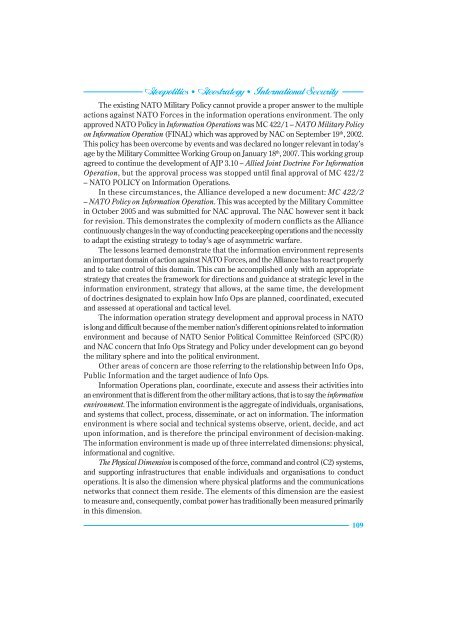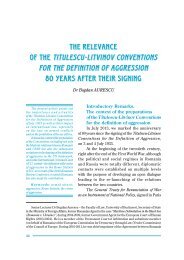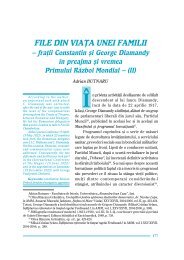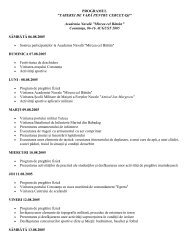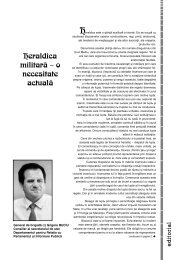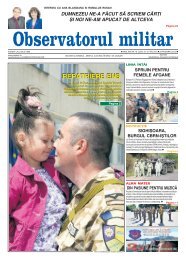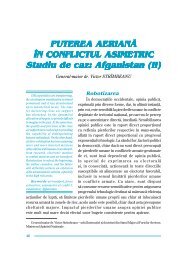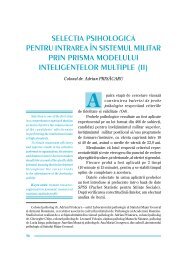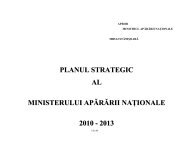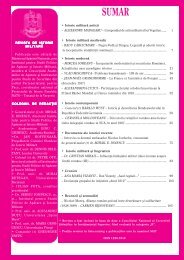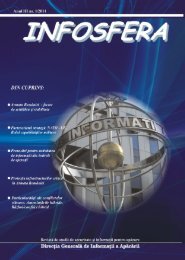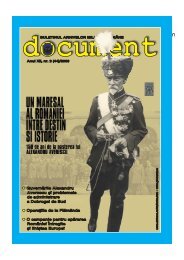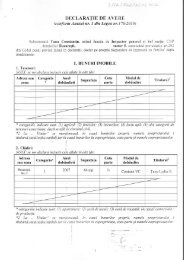Romanian Military Thinking
Romanian Military Thinking
Romanian Military Thinking
Create successful ePaper yourself
Turn your PDF publications into a flip-book with our unique Google optimized e-Paper software.
Geopolitics • Geostrategy • International Security<br />
The existing NATO <strong>Military</strong> Policy cannot provide a proper answer to the multiple<br />
actions against NATO Forces in the information operations environment. The only<br />
approved NATO Policy in Information Operations was MC 422/1 – NATO <strong>Military</strong> Policy<br />
on Information Operation (FINAL) which was approved by NAC on September 19 th , 2002.<br />
This policy has been overcome by events and was declared no longer relevant in today’s<br />
age by the <strong>Military</strong> Committee Working Group on January 18 th , 2007. This working group<br />
agreed to continue the development of AJP 3.10 – Allied Joint Doctrine For Information<br />
Operation, but the approval process was stopped until final approval of MC 422/2<br />
– NATO POLICY on Information Operations.<br />
In these circumstances, the Alliance developed a new document: MC 422/2<br />
– NATO Policy on Information Operation. This was accepted by the <strong>Military</strong> Committee<br />
in October 2005 and was submitted for NAC approval. The NAC however sent it back<br />
for revision. This demonstrates the complexity of modern conflicts as the Alliance<br />
continuously changes in the way of conducting peacekeeping operations and the necessity<br />
to adapt the existing strategy to today’s age of asymmetric warfare.<br />
The lessons learned demonstrate that the information environment represents<br />
an important domain of action against NATO Forces, and the Alliance has to react properly<br />
and to take control of this domain. This can be accomplished only with an appropriate<br />
strategy that creates the framework for directions and guidance at strategic level in the<br />
information environment, strategy that allows, at the same time, the development<br />
of doctrines designated to explain how Info Ops are planned, coordinated, executed<br />
and assessed at operational and tactical level.<br />
The information operation strategy development and approval process in NATO<br />
is long and difficult because of the member nation’s different opinions related to information<br />
environment and because of NATO Senior Political Committee Reinforced (SPC(R))<br />
and NAC concern that Info Ops Strategy and Policy under development can go beyond<br />
the military sphere and into the political environment.<br />
Other areas of concern are those referring to the relationship between Info Ops,<br />
Public Information and the target audience of Info Ops.<br />
Information Operations plan, coordinate, execute and assess their activities into<br />
an environment that is different from the other military actions, that is to say the information<br />
environment. The information environment is the aggregate of individuals, organisations,<br />
and systems that collect, process, disseminate, or act on information. The information<br />
environment is where social and technical systems observe, orient, decide, and act<br />
upon information, and is therefore the principal environment of decision-making.<br />
The information environment is made up of three interrelated dimensions: physical,<br />
informational and cognitive.<br />
The Physical Dimension is composed of the force, command and control (C2) systems,<br />
and supporting infrastructures that enable individuals and organisations to conduct<br />
operations. It is also the dimension where physical platforms and the communications<br />
networks that connect them reside. The elements of this dimension are the easiest<br />
to measure and, consequently, combat power has traditionally been measured primarily<br />
in this dimension.<br />
109


